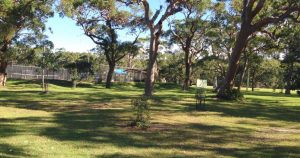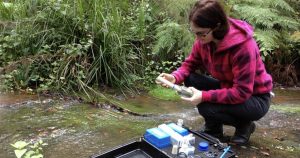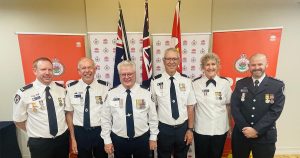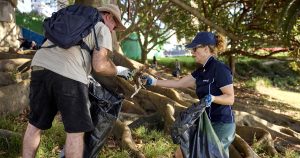[vc_row][vc_column width=”1/6″ offset=”vc_col-lg-1/5 vc_col-md-1/5 vc_col-xs-1/5″][us_image image=”81825″ size=”thumbnail” align=”left” style=”circle” has_ratio=”1″][/vc_column][vc_column width=”1/12″ offset=”vc_col-lg-4/5 vc_col-md-4/5 vc_col-xs-4/5″][vc_column_text]By Annette Madjarian[/vc_column_text][us_post_date][/vc_column][/vc_row][vc_row][vc_column][vc_column_text]Glenhaven residents Graham and Adele Staggs have been honoured for their tireless support and advocacy for helping people to deal with prostate cancer.
The husband and wife duo were presented with the Prostate Cancer Foundation of Australia’s prestigious Max Gardner Award for Distinguished Service on July 18 at the Anglican Retirement Villages Glenhaven, where they have lived for over nine years. It’s also where they hold their monthly support meetings for Hills locals.
In 2004, Graham received a shock prostate cancer diagnosis after a blood test revealed abnormally high prostate-specific antigen (PSA) levels.
Graham went on to have a radical prostatectomy – something which still shocks him, considering “like most men” he “was totally oblivious”. “I didn’t know what a prostate was – I didn’t even know I had one!”
However, Graham, 85, and Adele, 80, not only took the diagnosis in their stride, they began to offer critical support to others in the same boat and have been doing so for more than 18 years.
Prostate Cancer Foundation of Australia (PCFA) CEO Anne Savage said community members such as Graham and Adele played a vital role in providing men and their loved ones with information, comfort, and support, calling on their own personal experiences to make a difference in the lives of others.
The Staggs’ founded the Dural Prostate Cancer Support Group some 10 years ago. They hold monthly meetings for not only men with prostate cancer but also their partners, who more often than not, are their primary carers.
Adele started a support group for wives and partners, affectionately known as “the prostate girls”, as a forum for sharing experiences and meeting socially.
“At the end of the day, you’re there for each other, which is so important,” Adele said.
Unfortunately for Graham, his battle with prostate cancer did not end with his prostatectomy. Some 10 years later, his doctor once again found elevated PSA levels, which led him to radiation therapy. But this came at a cost – Graham was left with radiation proctitis of the rectum, a side effect of the radiation.
The main message that Graham offers is that men ask their GPs to include their PSA levels in their routine blood tests.
“Treatments nowadays are so much better, but the main thing is, try and get it early.”
Graham’s sentiment is echoed by the Prostate Cancer Foundation of Australia, which says that prostate cancer is now the most commonly diagnosed cancer in the country, overtaking breast cancer, and certainly the most common among men.
Data released last month (July 2022) by the Australian Institute of Health and Welfare estimates that 24,217 Australian men will be diagnosed with prostate cancer this year (a 34 per cent increase on the previous year), compared to 20,640 women diagnosed with breast cancer.
The PCFA has called on an urgent review of the nation’s Clinical Guidelines for PSA Testing which are now six years old and based on outdated data.
“We have written to Federal Health Minister Mark Butler to fast-track our review of Australia’s current PSA Test Guidelines and feel confident that based on these latest figures we will be able to secure his support,” Prostate Cancer Foundation of Australia Chairman, Adjunct A/Professor Steve Mr Callister said.
“The latest estimates also suggest more than 3,500 men will die from prostate cancer this year, which is a toll we can avoid if the disease is diagnosed early.”
PCFA Chief of Mission and Head of Research, Professor Jeff Dunn AO, said greater awareness would be key to reducing deaths from the disease.
“PCFA surveys have found that 75 per cent of Australians do not know the PSA test guidelines, an alarmingly high level of unawareness that impedes early detection and diminishes populationwide survival prospects,”
“If we can diagnose all men at the earliest stage and ensure they have access to new medicines and care, we can beat this disease.”
Graham and Adele Staggs in the meantime will continue to provide vital peer support and outreach to the Hills community for “as long as they can”.
For more information, visit www.pcfa.org.au.[/vc_column_text][/vc_column][/vc_row]








